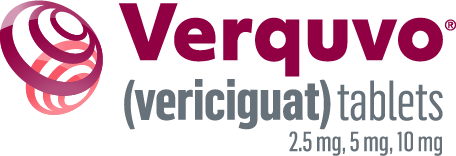WARNING: EMBRYO-FETAL TOXICITY
Females of reproductive potential: Exclude pregnancy before the start of treatment. To prevent pregnancy, females of reproductive potential must use effective forms of contraception during treatment and for one month after stopping treatment. Do not administer VERQUVO to a pregnant female because it may cause fetal harm.
- VERQUVO is contraindicated in patients with concomitant use of other soluble guanylate cyclase (sGC) stimulators.
- VERQUVO is contraindicated in pregnancy.
- Embryo-Fetal Toxicity: Based on data from animal reproduction studies, VERQUVO may cause fetal harm when administered to a pregnant woman. Advise females of reproductive potential of the potential risk to a fetus. Obtain a pregnancy test before the start of treatment. Advise females of reproductive potential to use effective contraception during treatment with VERQUVO and for at least one month after the final dose.
- There is a Pregnancy Surveillance Program that monitors pregnancy outcomes in women exposed to VERQUVO during pregnancy. Health care providers should report any prenatal exposure by calling 1-877-888-4231 or at https://pregnancyreporting.verquvo-us.com.
- In a clinical trial, the most commonly observed adverse events with VERQUVO vs placebo, occurring at a frequency ≥5%, were hypotension (16% vs 15%) and anemia (10% vs 7%).
- Concomitant use of VERQUVO with PDE-5 inhibitors is not recommended due to the potential for hypotension.
- There are no data on the presence of vericiguat in human milk, the effects on the breastfed infant, or effects on milk production. Because of the potential for serious adverse reactions in breastfed infants from VERQUVO, advise women not to breastfeed during treatment with VERQUVO.
Before prescribing VERQUVO, please read the accompanying Prescribing information including the Boxed Warning about embryo-fetal toxicity. The Medication guide also is available.

